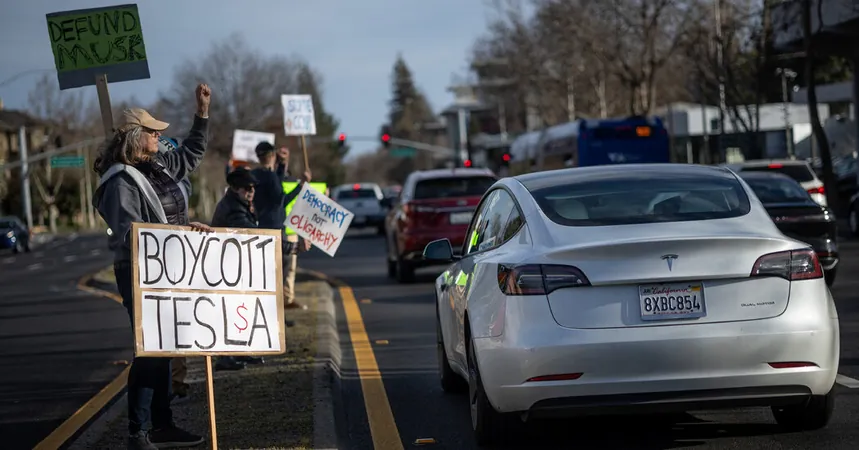
Can Trump and Musk Rally Conservatives to Boost Tesla Sales?
2025-03-16
Author: Ying
In a surprising twist last week, former President Donald Trump hopped aboard a Tesla Model S and declared his intention to purchase one. Shortly after, conservative media personality Sean Hannity announced his own purchase of a Model S Plaid, stating that Teslas contain more American-made parts than any other vehicle produced in the U.S.
In response to a perceived backlash against Elon Musk's polarizing tactics, a group of prominent conservatives has thrown their support behind Tesla, attempting to attract like-minded buyers who may be swayed by Trump's influence to counteract a growing boycott among liberals and Democrats. However, experts question the effectiveness of this initiative.
Analysts suggest that, despite some conservative support, the scale of the boycott from Democratic consumers is significant enough that even Trump's endorsement may not convert a sufficient number of new customers to stabilize Tesla's sales. Predictions from JPMorgan indicate that Tesla may experience its lowest delivery numbers in over three years during the upcoming first quarter.
Alexander Edwards, president of Strategic Vision, an automotive research and consulting firm, commented on this dilemma: “When you make your product unattractive to half the market, I promise you, you won’t increase your sales.” Historically, surveys have shown that electric vehicle owners were predominantly more likely to identify as Democrats. However, recent trends indicate a shift, with Tesla buyer demographics creeping towards a more Republican base—30% versus 29% as of this year, may suggest an interesting social shift among electric vehicle owners.
The shift began when Musk acquired Twitter (now X) in 2022, and intensified after he publicly endorsed Trump last July, causing a dramatic decline in interest from Democratic customers. Presently, only about 8% of vehicle owners consider buying a Tesla, a stark drop from 22% five years ago.
Despite these challenges, Tesla remains the leading electric vehicle brand in the U.S., holding a substantial market share of 44%, although it saw a 5.6% decline in 2024 sales, translating to approximately 634,000 vehicles sold, according to Kelley Blue Book.
Many loyal customers, like Josh Anders from Fort Wayne, Indiana, remain devoted to Tesla for its innovative technology, energy efficiency, and low maintenance needs. Anders, a conservative father of four, reportedly finds comfort and purpose in a brand that pushes boundaries, even if its owners don’t always share his political beliefs.
The vehicle market has long been intertwined with political narratives, as cars often become symbols of broader ideological divides. For instance, the Chevrolet Volt faced critique from some conservatives branding it the “Obamacar.” With Tesla now finding itself caught in a similar crossfire, it illustrates the ongoing ideological battle around electric vehicles.
Isaac Seliger, an independent business owner from Scottsdale, Arizona, shared his motivations for considering Tesla amidst political polarization, challenging assumptions about vehicle ownership as a political statement. His desire to defy groupthink serves as part of a broader narrative as more consumers seek to make personal statements through their purchases.
However, despite the unwavering support from some customers who revere Musk and his vision, experts express concerns about Tesla's ability to maintain its market dominance due to a lack of new models and consistent updates. Competitors are increasingly entering the electric vehicle market with models that offer appealing price points and unique features, potentially eroding Tesla's once-lined advantages in technology and convenience.
The challenges aren’t only present in the market; attitudes toward electric vehicles vary drastically among political lines, with many conservatives slower to adopt fully electric models, often due to practical concerns and regional infrastructure, particularly in rural areas where charging stations are scarce. According to a Pew Research survey, Republicans are also more likely to doubt the affordability and reliability of electric cars compared to their Democratic counterparts.
New registration statistics paint a complex picture. While Tesla registrations dipped by 13% in New York City, the brand remained exceedingly popular in Los Angeles, where registrations fell just 8%. The picture brightens in more conservative-leaning markets like Miami-Fort Lauderdale, where sales surged, highlighting the uneven landscape of Tesla's market share.
As the battle for the electric vehicle market continues to unfold amid shifting political loyalties and consumer perceptions, Tesla's journey exemplifies the intricate interplay between technology, consumer choice, and the ongoing cultural and political divides that shape our world today. Will Trump and Musk succeed in their bid to rally conservatives toward the electric titan, or is Tesla’s reign in the increasingly competitive EV market at risk? Stay tuned!



 Brasil (PT)
Brasil (PT)
 Canada (EN)
Canada (EN)
 Chile (ES)
Chile (ES)
 Česko (CS)
Česko (CS)
 대한민국 (KO)
대한민국 (KO)
 España (ES)
España (ES)
 France (FR)
France (FR)
 Hong Kong (EN)
Hong Kong (EN)
 Italia (IT)
Italia (IT)
 日本 (JA)
日本 (JA)
 Magyarország (HU)
Magyarország (HU)
 Norge (NO)
Norge (NO)
 Polska (PL)
Polska (PL)
 Schweiz (DE)
Schweiz (DE)
 Singapore (EN)
Singapore (EN)
 Sverige (SV)
Sverige (SV)
 Suomi (FI)
Suomi (FI)
 Türkiye (TR)
Türkiye (TR)
 الإمارات العربية المتحدة (AR)
الإمارات العربية المتحدة (AR)